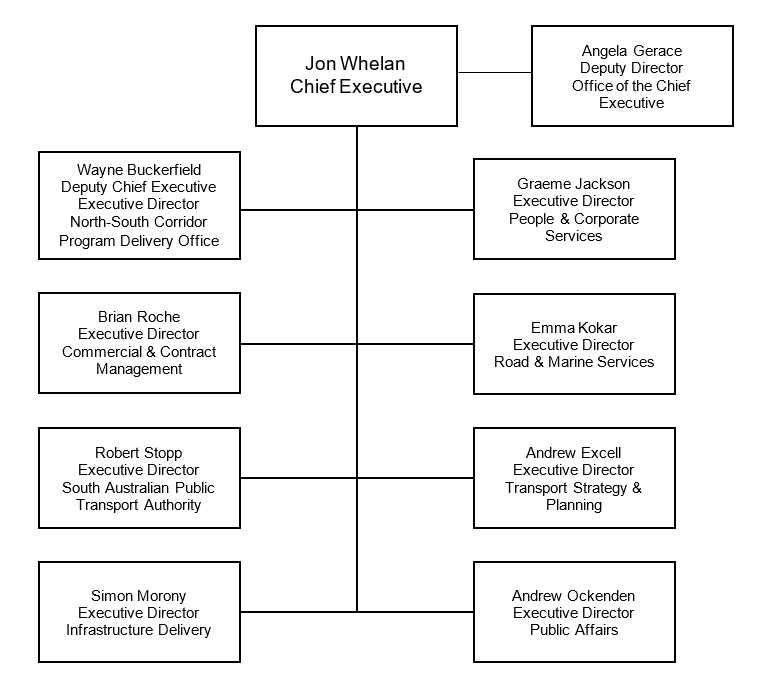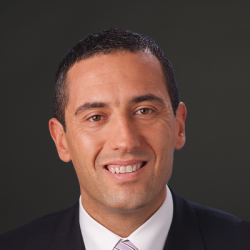The Department administers the Passenger Transport Act 1994 (the PT Act) and Passenger Transport Regulations 2009 by planning, regulating and funding public transport services (bus, train and tram, taxi and hire car) across South Australia. Pursuant to section 24A of the PT Act the following report is provided.
The Department has performance-based franchise contracts with bus, tram and train operators that keeps the operator focused firmly on the efficiency and quality of service delivery to customers. The government retains ownership of rail assets (including trains, trams, tracks, stations and all infrastructure); sets requirements for levels of services; continues to set the fare price for travel on bus, tram and trains and retains the revenue.
Public transport bus and tram services across metropolitan Adelaide are provided by four private transport providers, Torrens Transit Pty Ltd which operates three contract areas (East West, Outer North and Outer North East); Busways South Australia Pty Ltd which operates the Outer South contract area; and Australian Transit Enterprises Pty Ltd trading as Southlink which operates the Hills contract area. Torrens Connect (a joint venture between Torrens Transit Pty Ltd, UGL Rail Services Pty Ltd and John Holland Pty Ltd) provide both bus and light rail services in the North-South contract area.
The bus and tram contracts commenced on 5 July 2020. Rail infrastructure maintenance for tram functions (i.e. within track, civil, signalling and overhead) transitioned to Torrens Connect on 31 January 2021, in line with the commencement of the new train contract.
The Outsourced Rail Operations Agreement with Keolis Downer Adelaide commenced on 31 January 2021, for the operation and maintenance of the Adelaide Metropolitan Passenger Rail Network, which consists of six commuter routes on four main lines with the provision of asset management and rolling stock maintenance services.
In line with the South Australian Government’s election commitment to return rail to government hands, an agreement has been reached with the train operator Keolis Downer Adelaide and tram operator Torrens Connect to hand back operational functions by January 2025, and July 2025 respectively.
Public transport services in regional South Australia are administered by the Department. These include regular route services (country bus services), provincial city services, integrated transport plans, special medical-related services and Dial-a-Ride services.
The Department supports community passenger networks across regional South Australia and within metropolitan Adelaide. The Community Passenger Networks Program is established to facilitate access to transport for people who are transport disadvantaged. The program is jointly funded by the Commonwealth Home Support Program and the Department of Human Services.
The Department is committed to continually improving public transport services and infrastructure and making public transport more accessible and easier to use for all users. The metropolitan bus fleet is now 100% accessible.
The Department's Station Upgrade Program continues to upgrade selected stations along metropolitan passenger rail lines to provide safer and more efficient services for train customers, with all improvements focusing on accessibility in line with the Disability Discrimination Act 2002, for public transport services. Improved facilities for commuters include new shelters, improved lighting, platform furniture, additional cover, improved access, pedestrian crossings, bike enclosures, additional CCTV cameras, new access paths and ramps along with new car parking facilities.
Departmental officers at the Adelaide Railway Station monitor accessibility gates and provide 'sighted guide' assistance to passengers to board trains if needed. Information regarding accessible journeys is published on the Adelaide Metro website.
Adelaide Metro patronage 2022–2023
The total patronage on the public transport system increased by 26.4% compared with the previous financial year.
Total patronage by mode
| Bus | Tram | Train | Total patronage* |
|---|
| 40,521,601 | 7,493,942 | 12,058,402 | 60,073,945 |
Total patronage by passenger type
| Regular | Concession | Student | Seniors | Free Travel | Special Passes | Total patronage* |
|---|
| 16,150,536 | 17,891,613 | 10,702,466 | 6,797,608 | 8,061,576 | 470,146 | 60,073,945 |
Total patronage by ticket type
| MetroCARD | Single trip | Daytrip | Free travel | Total patronage* |
|---|
| 50,881,812 | 849,310 | 281,247 | 8,061,576 | 60,073,945 |
*The figures listed above include free travel data.
Public Transport South Australia (PTSA) progressively introduced a range of additional new payment options including EMV (Eurocard, Mastercard and Visa) which allows full fare customers to tap onto the network using their credit and debit cards and new Buy & Go digital QR tickets through the Adelaide Metro Buy & Go app.
The progressive rollout of the new features and functions include:
| Tap and Pay (EMV) – Trams and O-Bahn Buses | September 2021 |
| Tap and Pay (EMV) – All Remaining Buses | November 2022 |
| Buy & Go app (Digital QR Tickets) | February 2024 |
Below are the patronage details for the new payment systems for the 2023-2024 financial year, noting that these numbers are already included in above tables.
| Tap and Pay* | Buy and Go* |
|---|
| 4,224,302 | 96,304 |
Special event services
On 23 October 2014, an amendment to the PT Act was enacted with respect to the management and funding of public transport for special events. The aim of the legislation is to facilitate the successful planning of special events in metropolitan Adelaide by requiring mandatory notification of major events and also to provide a mechanism for the costs of additional public transport services required for the event to be recovered where the event is considered a "commercial event".
The key elements of the legislation include the requirement for venue managers to notify the Department six months in advance (or as soon as the event is known) of any event expected to attract more than 5,000 patrons and, where additional public transport services are required, that commercial events contribute to the cost of these extra services.
Events are classified as one of two different categories of event for the purposes of the legislation. The two categories are:
- Commercial Events – organised for profit where there is a fee for participants either in the form of a ticket or an indirect fee i.e. membership of a club or association; or
- Community Events – organised as not for profit, the event is open to the community and attendance is free or a voluntary donation from attendees may be sought.
Based on the information provided in the notification form, the Department will make a determination regarding the need for additional or special public transport services to cater for the event and, where extra services are required, events categorised as "commercial" will be required to fund the services.
The 2022-2023 year saw the return of many major events and large crowds following the COVID-19 pandemic. Crowds at AFL games at Adelaide Oval returned to pre-COVID levels requiring the Department’s Adelaide Oval Express services to deliver these patrons safety to and from games. Other events such as the Royal Show and Christmas Pageant also saw increased crowds as COVID restrictions and arrangements were removed. The 2022 Royal Show was the first time that patrons were required to pre-purchase tickets and metroCARDs to use on public transport, with a large portion of patrons previously using cash to purchase tickets on board.
The Department undertook a significant public communication process to advise patrons to pre-purchase tickets, resulting in a successful event and transition to metroCARD ready for the 2023 event. This financial year also saw the return of the Adelaide 500 which required a significant number of additional and special bus, train and tram services over the course of the four-day event. This was also the case for the State of Origin Rugby which was held at Adelaide Oval and was supported by Adelaide Oval Express services across the network.
In addition to these events, Adelaide hosted two significant events in 2023, being AFL's first Gather Round and LIV Golf. Both of these events were the first of their kind in Australia and required considerable planning, coordination and collaboration with a number of stakeholders. The transport plan for both events was very successful, contributing a seamless, safe and enjoyable customer experience for patrons.
Regional services
The Department regulates and contributes to funding transport services in some regional areas.
Regular route services operate across regional South Australia and link major centres to Adelaide. Services operate in the Barossa Valley, Murray Mallee, Mid North, Upper North, Far North, Riverland, Eyre, South East and Fleurieu regions.
Integrated transport services operate in the Coorong District Council, Karoonda East District Council, Murray District Council, Southern Mallee District Council, Mid Murray District Council, Southern Yorke Peninsula, Tatiara District Council, Eastern Riverland, Upper North, Mid North, Adelaide Hills, Victor Harbor and on Kangaroo Island.
Dial-a-Ride door to door services are provided in Victor Harbor, Port Lincoln, Murray Bridge, the Copper Coast and Barossa Valley. These supplement regular timetabled services and extend the range of public transport options for these communities.
In 2022-2023, the Department completed the tender process for the 14 Phase 1 Regional Bus Service contracts, with the new contracts commencing on 1 October 2023. The funding for regional bus passenger services included in the 2022-2023 State Budget will ensure that current regional bus service levels are maintained. The State Budget funding will also ensure that all vehicles used for regional services comply with mandatory disability standards. The remaining Phase 2 contracts are scheduled to be released for tender in late 2023.
Based on data provided by regional bus operators, regional bus patronage in 2022-2023 was 599,705, an increase of 7.90% from the previous year.
The 2022-2023 patronage is at a similar level to the 2020-2021 data, recovering from the additional COVID-19 impacts in 2021-2022 (the State-wide lockdown in July 2021 and the opening of the border in November 2021).
Provincial city bus services
Regular passenger services operate in South Australia's provincial cities of Port Lincoln, Port Pirie, Whyalla, Port Augusta, Murray Bridge and Mount Gambier. Provincial city services are a combination of town and school services.
In the four years prior to the start of COVID-19, provincial city bus service patronage decreased by an average of 1.6% each year.
Based on data provided by provincial city bus operators, patronage in 2022-2023 was 312,712, a decrease of 1.29% from the previous year. As with the other regional bus services, the decrease is due to passengers appearing to have changed their travel habits or choosing alternative options, such as telehealth appointments, on-line shopping and delivery services.
Complaints, commendations and submissions
Feedback on public transport
Feedback from customers about passenger transport services is welcomed as it provides the ability to improve and assess existing services and practices. Customers are presented with multiple opportunities to provide their feedback through the Adelaide Metro website, Adelaide Metro InfoLine and InfoCentre, as well as social media such as Facebook and Twitter. Complaints represented 0.03% of total public transport patronage (initial boardings and transfers) in the 2022-2023 reporting year, with an increase of 2,932 (24%) compared to the previous year. There was an increase of 148 commendations (21%) compared to the previous year.
The table below shows feedback information on public transport.
| Feedback | 2017–2018 | 2018–2019 | 2019–2020 | 2020–2021 | 2021–2022 | 2022–2023 |
|---|
| Commendations | 914 | 897 | 692 | 602 | 703 | 851 |
| Suggestions | 1,134 | 1,336 | 908 | 874 | 694 | 818 |
Complaints | 2017–2018 | 2018–2019 | 2019–2020 | 2020–2021 | 2021–2022 | 2022–2023 |
|---|
| Service changes and service quality | 6,267 | 5,589 | 5,320 | 5,650 | 8,207 | 8,979 |
| Punctuality | 3,088 | 2,905 | 1,701 | 2,122 | 3,121 | 5,095 |
| Fares and ticketing | 437 | 332 | 454 | 442 | 523 | 618 |
| Passenger comfort | 1,130 | 1,346 | 306 | 335 | 254 | 345 |
| Other | 323 | 225 | 44 | 0 | 0 | 0 |
| Total complaints | 11,245 | 10,397 | 7,838 | 8,549 | 12,105 | 15,037 |
Feedback on taxi and Small Passenger Vehicle (SPV) services
The Department receives complaints and commendations regarding taxis and small passenger vehicles. Complaints may lead to disciplinary action if a breach of the regulations under the PT Act is found to have occurred.
The table below shows feedback information on taxis and SPVs.
| Feedback | 2018–2019 | 2019–2020 | 2020–2021 | 2021–2022 | 2022–2023 |
|---|
| Commendations | 3 | 1 | 0 | 0 | 1 |
| Complaints | 172 | 109 | 103 | 204 | 228 |
As at June 2023, there were 5,572 small passenger vehicles in the metropolitan area that can provide point to point services; an increase from 4,974 in 2021-2022.
Waiting times
The taxi Centralised Booking Services reported that the average waiting time for general taxis in metropolitan Adelaide for 2022-2023 was 6 minutes and 30 seconds during the day (6am to 6pm), and 8 minutes and 30 seconds at night (6pm to 6am). The figures include waiting times for phone-booked, hailed and taxi rank trips and meet the prescribed waiting time of 12 minutes, as stated in the conditions for accreditation.
There were 1,035 general licences in metropolitan Adelaide in 2022-2023, noting that not all licences were operational.
Access Taxis
The taxi Centralised Booking Services reported that the average waiting time for Access Taxis in metropolitan Adelaide for 2022-2023 was 5 minutes and 25 seconds during the day (6am to 6pm) on weekdays and 5 minutes and 30 seconds on weekends, and 13 minutes and 25 seconds at night (6pm to 6am) on weekdays and 13 minutes and 30 seconds on weekends.
Average waiting times for Access Taxis improved from 2021-2022, when the average waiting times were 6 minutes and 13 seconds during the day (6am to 6pm) on weekdays and 8 minutes and 3 seconds on weekends, and 17 minutes and 44 seconds on a weekday night (6pm to 6am).
Approximately 5,002 Access Taxi jobs took more than 30 minutes to pick up the passenger. This compares with 9,286 in 2022-2023, representing a reduction of 53%.
As at 30 June 2023, there are 102 general licences with special conditions (Access Taxis), noting that not all licences are operational.
Passenger Transport Standards Committee
The Passenger Transport Standards Committee (PTSC) is a statutory committee, established under the PT Act, responsible for exercising disciplinary powers under Part 4, Division 5 of the PT Act and for exercising or performing such other powers or functions as may be conferred by the Minister from time to time.
In 2022-2023, the PTSC sat on 103 occasions and considered 1,077 matters which comprised:
- 190 accreditation applications; and
- 887 disciplinary matters.
Of the 887 disciplinary matters, the PTSC:
- suspended the accreditation of 377 accredited persons for a period of time;
- revoked the accreditation of 480 accredited persons and disqualified them for a period of time; and
- permanently disqualified 1 person from holding accreditation under the PT Act.
The remainder were dealt with by other actions, such as a fine, reprimand, caution issued; or found to have no cause to answer.
Disciplinary matters included people who failed to demonstrate they met the standards and requirements to hold an accreditation under the PT Act.
Temporary suspensions primarily related to administrative matters, such as the suspension of a driver’s licence through the fines enforcement system, or following an alcohol related driving offence or after the expiry of annual medical clearances. In these instances, the suspension remains until the driver’s licence has been reinstated or until the updated medical report is provided indicating that the person meets the commercial medical standards to drive a public passenger vehicle.
The majority of accreditation revocations relate to interstate driver’s licence transfers, as a driver cannot hold an accreditation in South Australia if they do not live in the state (with the exception of cross-border workers). Others had their accreditation revoked because their working with children check had been revoked, or their driver’s licence was disqualified or cancelled.
After holding an enquiry, the PTSC found no cause for disciplinary action against four accredited persons, while the remaining accredited persons were fined or reprimanded.
In addition to the above disciplinary matters, the PTSC also placed conditions on the accreditation of three persons.
An increase in disciplinary measures can be attributed to several factors:
- There has been an increase in passenger transport activity in the recovery from COVID-19.
- There are more on-road compliance officers undertaking more enforcement activities.
- Implementation of business process improvements in the administration of licence regulation and the accreditation of medical requirements.




